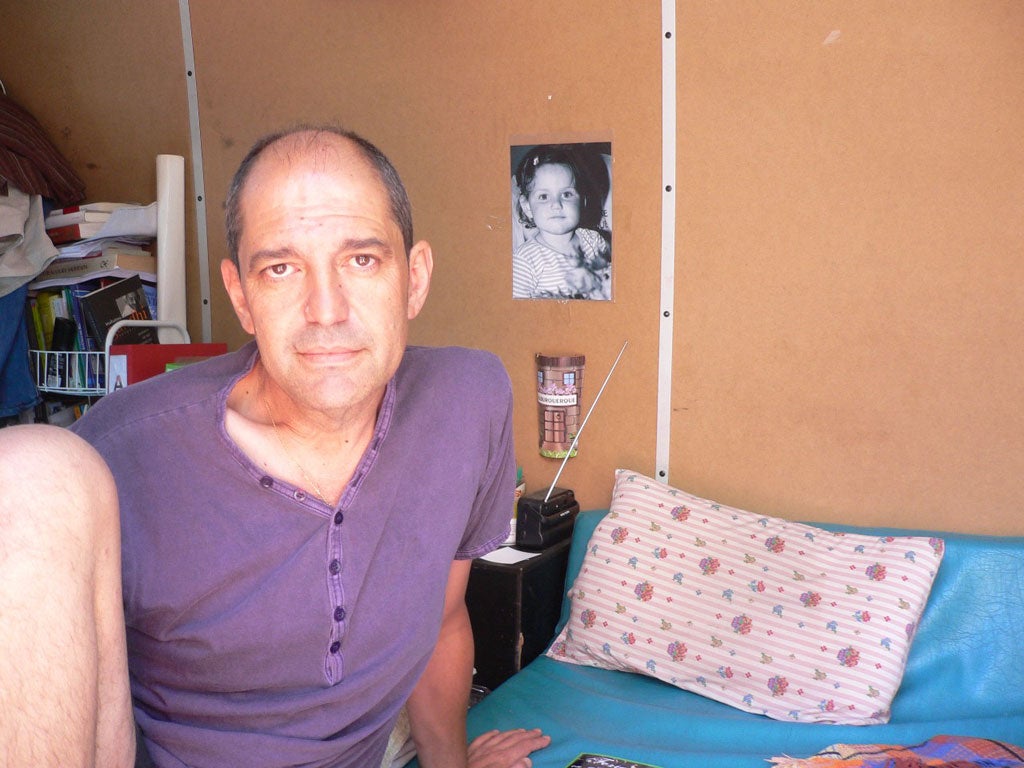'If they allow a mayor of the town to die, for a democracy, that's a serious problem'
Mayor starving himself in protest at austerity policies. By Alasdair Fotheringham

Your support helps us to tell the story
From reproductive rights to climate change to Big Tech, The Independent is on the ground when the story is developing. Whether it's investigating the financials of Elon Musk's pro-Trump PAC or producing our latest documentary, 'The A Word', which shines a light on the American women fighting for reproductive rights, we know how important it is to parse out the facts from the messaging.
At such a critical moment in US history, we need reporters on the ground. Your donation allows us to keep sending journalists to speak to both sides of the story.
The Independent is trusted by Americans across the entire political spectrum. And unlike many other quality news outlets, we choose not to lock Americans out of our reporting and analysis with paywalls. We believe quality journalism should be available to everyone, paid for by those who can afford it.
Your support makes all the difference.Every weekday morning, Angel Vadillo, mayor of the Spanish town of Alburquerque, holds meetings, replies to emails, and fields telephone calls. Indeed, it would be business as usual, were it not that Mr Vadillo is currently on day 74 of a hunger strike outside the industry in Madrid.
For over two months, Mr Vadillo has been conducting a one-man fight against austerity measures that have, he says, ruined prospects for Spain's renewable energy industry. Visibly emaciated, his only daily sustenance is eight litres of water with honey as he sits in a hired van in a car park near the ministry gates.
"They could let me die, but if they allowed a mayor of a town to die, for a democracy, that's a serious problem," Mr Vadillo tells i as he shakily rolls a cigarette. "The more I suffer, the more attention people are going to pay me."
His decision to strike came after the Industry Minister, Jose Manuel Soria, announced all subsidies for new renewable energy projects would be cut in January as part of austerity measures to help curb Spain's debt crisis. Mr Vadillo says the consequences for Alburquerque, whose economic future was heavily dependent on five new solar power plants, are disastrous.
With the power plant plans on hold, the mayor estimates some 850 workers in Alburquerque, a town of 5,000 near the Portuguese frontier in Extremadura, will now join Spain's millions of unemployed. Not only that – the €36m of taxes that filled Alburquerque's coffers thanks to advance payments by the new plants have been wiped out, forcing him to close the town's old people's home as well as a centre for the disabled.
His fury at what he views as unnecessary job losses (the cuts are estimated at 10,000 across Spain) and the Government's failure to exploit a natural resource that Spain has in abundance – solar power – provoked first his lone 400km protest march from Alburquerque to Madrid, and now his hunger strike.
"We're in recession and we could generate employment with these sorts of projects," Mr Vadillo says. "We have the technology and it seems incredible that Spain does exactly the opposite that we need to as a country."
Mr Vadillo says he will end the strike when the ministry, which plans to save around €190m as a result of the ban, initiates negotiations with all parties affected by the cuts.
As befits a protest sparked by austerity measures, the interior of Mr Vadillo's white van is sparse in the extreme. A bare mattress lies on the floor, a photo of Charlie Chaplin is stuck to the wall – "He inspires me, along with Gandhi" says Mr Vadillo – and several bottles of water and cans of honey are grouped at one end. Along with a mobile phone and computer – both powered by solar energy – that is pretty much it. He has lost 23kg and 5cm of muscle mass since his strike started
"The public health service comes by once a week and I send in my medical reports to a judge, and if one of my vital organs breaks down, I know he'll probably send me to hospital. But as soon as they let me out, I'll stop eating again."
"The hunger strike was a last resort. But I've found that nothing is in its right place and what little that I can do, I will try to do it."
Join our commenting forum
Join thought-provoking conversations, follow other Independent readers and see their replies
Comments